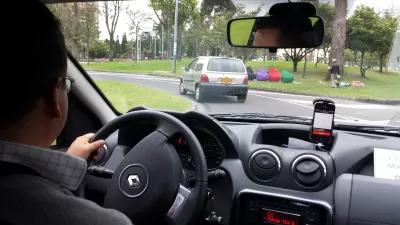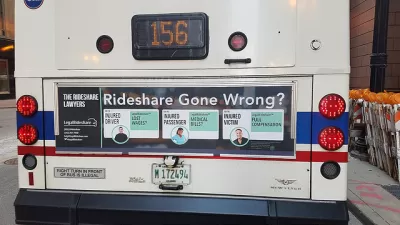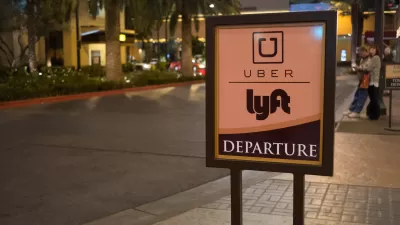"If the 20th century was devoted to building the infrastructure to service the personal automobile, then perhaps the 21st century will be devoted to undoing most of it."

Patrick Russell makes a compelling case for the growth of ride-sharing services like Uber and Lyft.
Income savings
Recent data reveal that when Americans have more money in their pockets, they often spend it on higher-quality gasoline. AAA estimates that the typical two-car household stands to save 16 percent of their income by ditching one car. What about the cost of ride-sharing services? Stefan Heck and Matt Rogers claim in their book Resource Revolution that American households pay roughly $8,700 per year on their cars, but that these cars typically remain parked in the driveway 96 percent of the time.
Energy efficiency
One study found that one ride-share car can replace between 9 and 13 personal cars. Furthermore, the fuel economy of ride-share cars is typically better than the average personal vehicle. (Uber drivers tend to drive practical sedans rather than luxury SUVs or sports cars, but as the collaborative economy expands, it’s not hard to imagine expanded choice for those willing to pay for luxury.)
Productive land use
That's not only less cars on the road, but also significantly less cars parked on the street and in parking lots. Russell imagines the possibilities.
"Imagine that every single road wider than 4 lanes was given a road diet by city planners and transportation engineers. Rights-of-way could be returned or resold to businesses that face the roadways; promenades for pedestrians could be widened and lined with trees; housing could be added to the right real estate market of major cities. Indeed, a six-lane highway could be trimmed to a 2-lane roadway with a turn lane, bicycle lanes and sidewalks — and still leave enough room for the development of row houses along the edge."
Future demand
Russell points out that millennials prefer to spend their money on experiences—not consumer goods. The 18-year old of generations past may have dreamed of a souped-up sports car; today’s 18-year old dreams of where it can take her.
FULL STORY: Ride Sharing Will Give Us Back Our Cities

Planetizen Federal Action Tracker
A weekly monitor of how Trump’s orders and actions are impacting planners and planning in America.

Restaurant Patios Were a Pandemic Win — Why Were They so Hard to Keep?
Social distancing requirements and changes in travel patterns prompted cities to pilot new uses for street and sidewalk space. Then it got complicated.

Map: Where Senate Republicans Want to Sell Your Public Lands
For public land advocates, the Senate Republicans’ proposal to sell millions of acres of public land in the West is “the biggest fight of their careers.”

Maui's Vacation Rental Debate Turns Ugly
Verbal attacks, misinformation campaigns and fistfights plague a high-stakes debate to convert thousands of vacation rentals into long-term housing.

San Francisco Suspends Traffic Calming Amidst Record Deaths
Citing “a challenging fiscal landscape,” the city will cease the program on the heels of 42 traffic deaths, including 24 pedestrians.

California Homeless Arrests, Citations Spike After Ruling
An investigation reveals that anti-homeless actions increased up to 500% after Grants Pass v. Johnson — even in cities claiming no policy change.
Urban Design for Planners 1: Software Tools
This six-course series explores essential urban design concepts using open source software and equips planners with the tools they need to participate fully in the urban design process.
Planning for Universal Design
Learn the tools for implementing Universal Design in planning regulations.
Heyer Gruel & Associates PA
JM Goldson LLC
Custer County Colorado
City of Camden Redevelopment Agency
City of Astoria
Transportation Research & Education Center (TREC) at Portland State University
Camden Redevelopment Agency
City of Claremont
Municipality of Princeton (NJ)





























